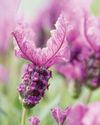Don’t be intimidated by these exotic beauties.

Many of us start our orchid growing with a Phalaenopsis or moth orchid that we received as a gift from a friend or that we decided to buy as it lasts much longer than a bunch of flowers. These orchids are mostly grown as a throwaway commodity, and in many cases the plants are discarded once they have finished flowering. Some of us who have feeling for plants and a bit of a green thumb decide to not throw away the plant but rather try our hand at getting it to grow and flower again. In some cases this is successful and in others not. There are, however, many different orchids that can be grown indoors with great success. Many orchids will be fine if placed indoors for the period in which they are in flower, but might require different growing conditions for the rest of the time.
Orchids need to be repotted on a regular basis as the potting medium (which is usually an organic mix) does break down over time, which results in poorer drainage and aeration and eventually the death of the plant. It is recommended that you repot your orchid at least every 2 – 3 years in order to replace the potting medium and, if necessary, pot into a bigger pot. In most cases the best time to repot would be in spring to allow the whole growing season for the plants to root in the new medium.
This story is from the July 2018 edition of The Gardener.
Start your 7-day Magzter GOLD free trial to access thousands of curated premium stories, and 9,000+ magazines and newspapers.
Already a subscriber ? Sign In
This story is from the July 2018 edition of The Gardener.
Start your 7-day Magzter GOLD free trial to access thousands of curated premium stories, and 9,000+ magazines and newspapers.
Already a subscriber? Sign In

FIRE AND Feathers!
On a dreary winter's day, a screen of fiery and feathery leaves puts up a fight against dullness!

GET THE ladies in!
At this time of year, early-flowering shrubs vie with each other to get the most attention. We say: Trust those with female names for frills and butterflies. They go the extra mile to flower their hearts out.

Vegetable Soups and dumplings
Vegetables make the most delicious soups and classic combinations are always a winner.

Yummy sweet potatoes for your good health
Boiled, baked or braaied, sweet potatoes (Ipomoea batatas) are a delicious and healthy winter comfort food. Just a dollop of butter, a little seasoning and you are good to go.

Pretty and functional
If cooking is your main thing, you would probably be more interested in the culinary value of the three herbs and some of their varieties we are describing.

Dried Seedheads & Pods
Autumn and winter are the best times to see what flowers produce the best seedheads that can be left on the plants to feed the birds and bugs and for harvesting for dried arrangements.

SO MANY FACES and so many choices...
Whoever associated a Cotyledon orbiculata (pig's ear) with the ear of a pig obviously did not know about all the varieties and cultivars this species in the genus Cotyledon has.

COLOURFUL Cold Weather WINNERS!
If it comes to a vote, these dependable shrubs will be the top candidates for prime performance in winter and in other seasons...

What makes a garden sustainable?
It is interesting to note that the United Nations defines sustainable development as: “development that meets the needs of the present without compromising the ability of future generations to meet their own needs”.

Nurturing NATURE-The Story of Kraal Garden's Transformation
Nestled within Prince Albert's rustic embrace lies a gem that is a testament to the transformative power of human vision and nature's bounty.